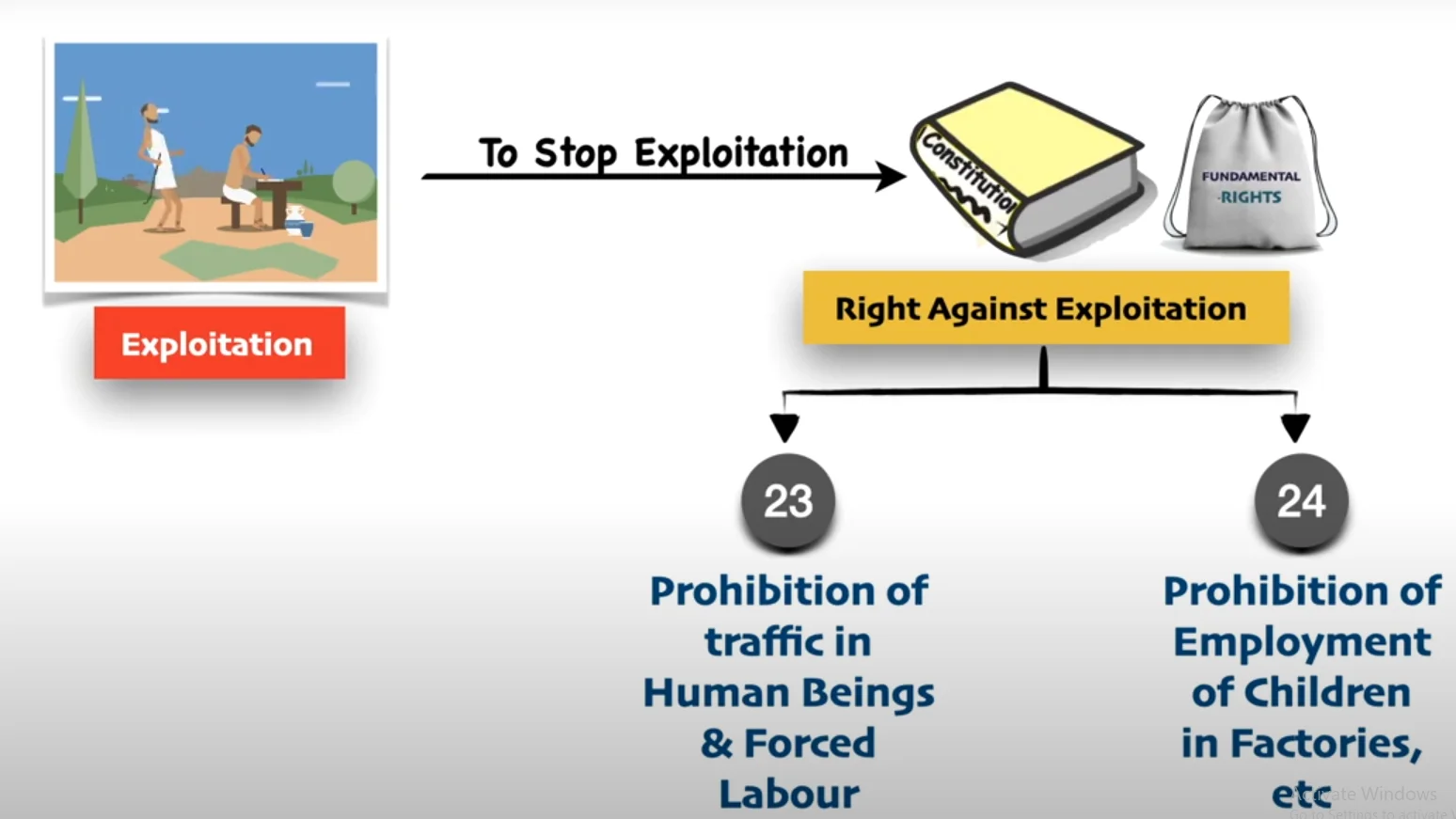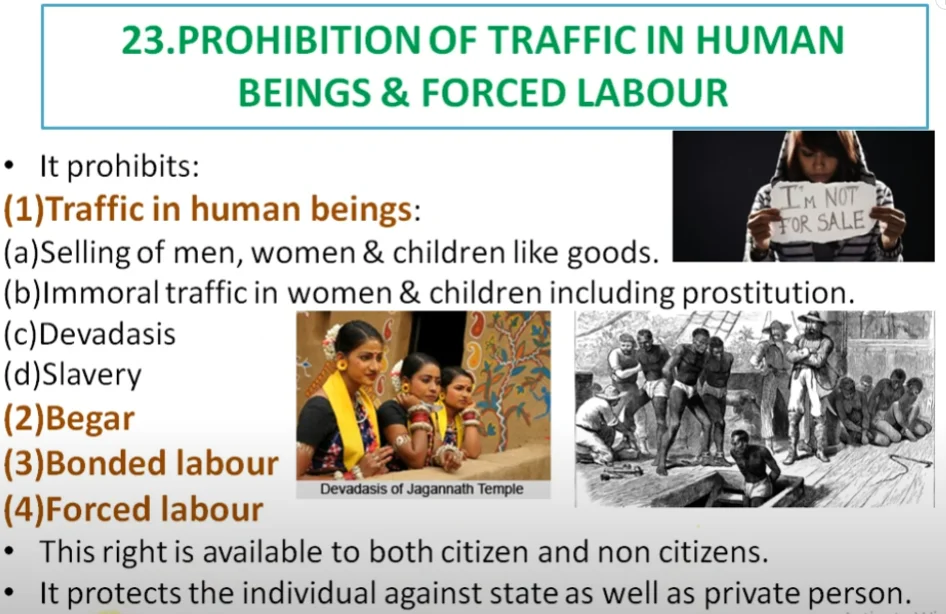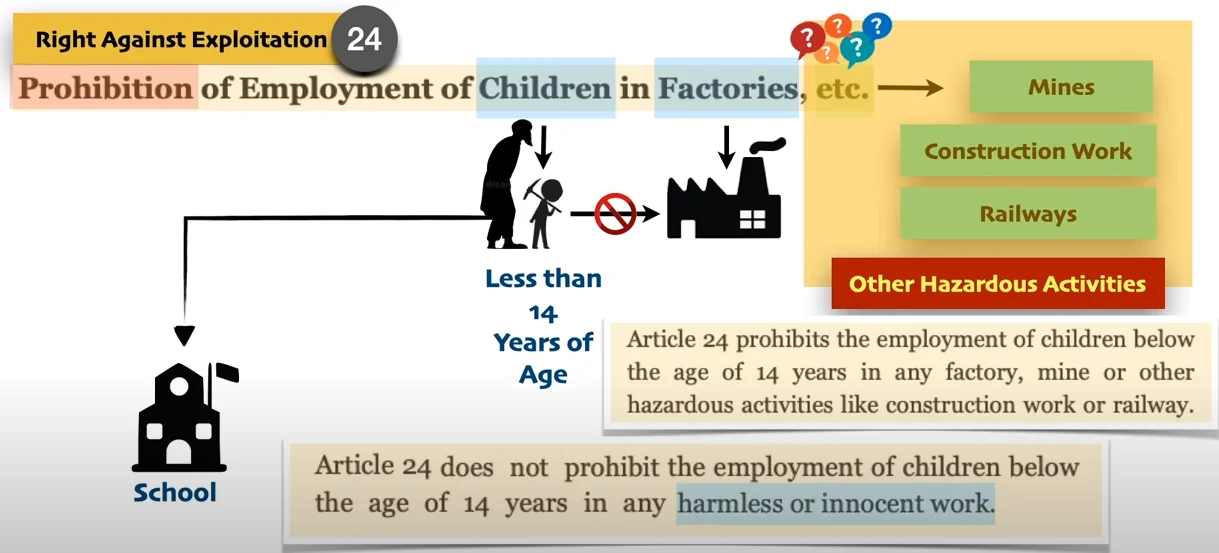Article 23 and 24 of the Indian Constitution safeguard individuals from exploitation and forced labour. Article 23 bans human trafficking, forced labour, and similar practices, offering protection to everyone, including non-citizens. Article 24 prohibits the employment of children under 14 years in factories, mines, or hazardous work, ensuring their right to education and healthy development.
Right Against Exploitation: Understanding Articles 23 and 24 of the Indian Constitution

Enroll now for UPSC Online Course
Article 23: Prohibition of traffic in human beings and forced labour
Prohibition of Human Trafficking and Forced Labour: In this article the trading of human beings (also the devadasi ), begar (forced labour without payment), and other comparable forms of compulsory labour are banned, and any violation of this rule shall be punishable by law.
- This right is available to all (both citizens and foreigners).
- Universal Protection Against Exploitation: It not only provides protection against the state but also against private individuals.
- The Term ‘traffic In Human Beings’ Means:
-
- Buying and selling of human beings (men, women, children) as goods.
- The traffic in women and children for immoral purposes, such as prostitution
- The practice involving devadasis
- Slavery
- Legislative Measures Against Exploitation: To penalize these activities, the Parliament enacted the Immoral Traffic (Prevention) Act of 1956. Other laws complementary to this right are:

-
- Minimum Wage Act,1948.
- Immoral Traffic(Prevention) Act,1956.
- The Bonded Labour System (Abolition) Act, 1976.
- The Prohibition of Employment as Manual Scavengers and their Rehabilitation Act, 2013.
- Government-Imposed Compulsory Service: This article does not restrict the government from imposing compulsory service for the public good, for which it is not bound to pay and in imposing such service, the government shall not discriminate solely based on religion, race, caste, class, or any combination thereof.
| Countries like Israel and South Korea have a Conscription System (Mandatory military service). India can also bring this sort of compulsory public service if required but without any discrimination. |
- Definition and Historical Context of ‘Begar’: The term ‘begar’ refers to mandatory labour without any form of compensation, a practice historically present in India where landlords (zamindars) would often coerce their tenants into unpaid work.
- Additionally, begar in Article 23 prohibits other ‘similar forms of forced labour’ like ‘bonded labour’.
- Definition of ‘Forced Labor’: The term ‘Forced labor’ is defined as making an individual work against their wishes.
-
- Force’ here is interpreted broadly, encompassing not just physical or legal force but also the pressure from economic situations, which can lead a person to work for less than a legally mandated minimum wage.
- Broad Interpretation of ‘Force’: Forced labour’ means compelling an individual to work without their agreement.
- The term ‘force’ is broadly interpreted as including not just physical or legal force but also economic compulsion, driving a person to accept wages below the legal minimum.
| Articles 17,23 and 24 are such Fundamental rights that cannot be exercised alone, which means that they need a Parliamentary mandate for their implementation. |
Article 24: Prohibition of employment of children in factories, etc.
Article 24: No child below the age of fourteen years shall be employed to work in any factory or mine or engaged in any other hazardous employment.
- Scope of Prohibition: The prohibition extends to any labour that could jeopardize a child’s health, safety, or morals, recognizing the need for children of such a young age to focus on their education and development rather than being subjected to labour.
- But it does not prohibit their employment in any harmless or innocent work.
- Importance of Child Welfare: This constitutional protection is a part of the Fundamental Rights and acts as a directive for the state to legislate and enforce laws to eliminate child labour in hazardous industries.

- Legislation Prohibiting Child Employment: Following acts prohibit the employment of children below certain age:
- The Child Labour (Prohibition and Regulation) Act, 1986 which was renamed by 2016 Amendment Act as the Child and Adolescent Labour (Prohibition and Regulation) Act,1986.
- The Employment of Children Act, 1938;
- The Factories Act, 1948;
- The Mines Act, 1952;
- The Merchant Shipping Act, 1958;
- The Plantation Labour Act, 1951;
- The Motor Transport Workers Act, 1951;
- Apprentices Act, 1961;
- The Bidi and Cigar Workers Act, 1966;
- Establishment of Commissions and Courts: The Commission for Protection of Child Rights Act,2005 provided for the establishment of a National Commission for Protection of Child Rights and Children’s Courts for speedy trials of offenses against children.
- Government Ban on Child Labour in Specific Sectors: The government in 2006 prohibited the employment of children as domestic servants or workers in hotels, dhabas, factories, resorts, tea shops, and spas, etc.
Enroll now for UPSC Online Course
-
- The person employing children below 14 years of age would be liable for penal actions.
| Must Read | |
| Current Affairs | Editorial Analysis |
| Upsc Notes | Upsc Blogs |
| NCERT Notes | Free Main Answer Writing |
Conclusion
Articles 23 and 24 emphasize India’s commitment to human dignity and child welfare.
- By prohibiting forced labour, trafficking, and child employment in hazardous jobs, these provisions ensure legal and social safeguards.
- Complementary laws and acts support these articles, reflecting the country’s efforts to combat exploitation and promote a just society.
Sign up for the PWOnlyIAS Online Course by Physics Wallah and start your journey to IAS success today!

 GS Foundation
GS Foundation Optional Course
Optional Course Combo Courses
Combo Courses Degree Program
Degree Program









